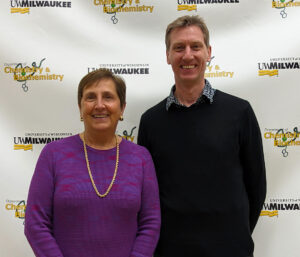
Prof Finn and Prof Arnold
Dr. Finn is University of Pittsburgh Distinguished Professor of Immunology and Surgery. After receiving her PhD in Medical Microbiology at Stanford University in 1980 and completing her postdoctoral training in Immuno-oncology there in 1982, Dr. Finn started her research at Duke University and in 1991 moved to the University of Pittsburgh. She gained prominence through her basic and applied research on tumor antigens and cancer vaccines. She has served and currently serves on NCI study sections and was a member of the NCI Board of Scientific Councilors. Dr. Finn is member of the American Association of Immunologists where she served as President in 2007/2008. She served two terms as Councilor of the International Union of Immunology Societies (IUIS) and as Chair of the IUIS Committee on Gender Equality and Career Development. She is a member of the American Association for Cancer Research (AACR) and the Society for Immunotherapy of Cancer (SITC). Dr. Finn received numerous awards including the AAI Life Time Achievement Award (2016), the NCI Outstanding Investigator Award (2016), the AACR CIR Lloyd Old Cancer Immunology Prize (2017) and SITC Richard Smalley Award (2019). In 2019 she was inducted into the inaugural class of AAI Distinguished Fellows and this year into the 2022 class of Fellows of the SITC Immuno-Oncology Academy.
Her presentation on Thursday 27th of April 2023 was titled:
Vaccines for Prevention and Interception of Human Non-Viral Cancers
Cancer vaccines have been in pre-clinical development and clinical testing for over three decades, ever since the first molecular characterization of tumor antigens that are recognized by the human immune system. Unlike vaccines against viral and bacterial pathogens that are used to prevent infections, cancer vaccines have been tested primarily in later stage disease as cancer therapy. Not surprisingly, they have not shown clinical efficacy and there are no therapeutic cancer vaccines on the market. This has led to a new approach to cancer vaccination–for prevention and cancer interception rather than therapy. This lecture will review the past preclinical and clinical work and present the current, more successful efforts, to test vaccines for cancer prevention.
Her presentation on Friday the 28th of April 2023 was titled:
Tumor Associated Antigens (TAA) are Disease Associated Antigens (DAA): A New View of Cancer Immunosurveillance
Healthy individual without a history of cancer can have pre-existing antibodies and T cells against numerous antigens abnormally expressed on cancer cells compared to normal cells. We have determined that these tumor associated antigens (TAA) can be transiently expressed on normal cells during viral infections and acute inflammation, defining them as disease associated antigens (DAA). Their abnormal expression is detected by the immune system that generates and boosts immune memory against them during repeated infections throughout life. In this lecture, data from both animal and human studies will be shown in support of the importance DAA/TAA in successful cancer immunosurveillance.